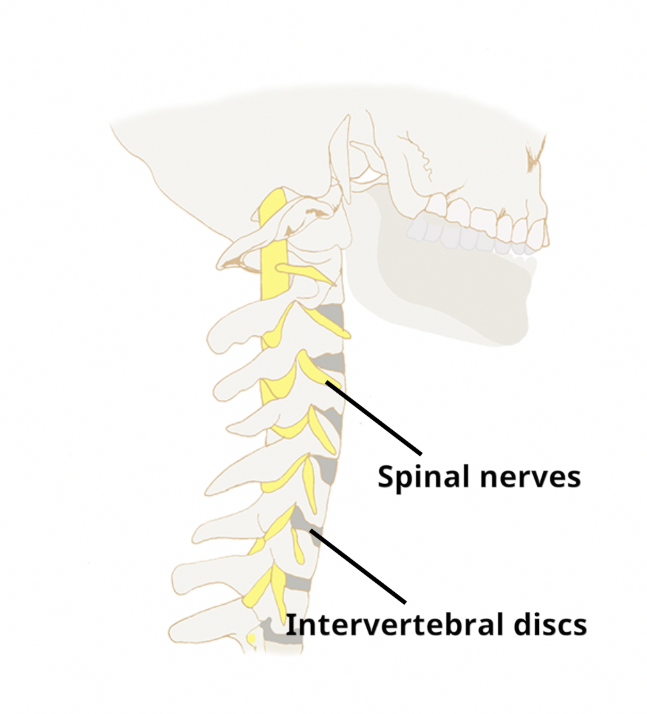
Neck pain may be associated with severe pain radiating down the arm as far as the hand which is known as radicular pain.
Many people will suffer with neck pain at some point in their adult life. A small percentage will experience irritation or pressure on the nerves that supply the arm, which can result in arm pains. The pain symptoms you experience can be severe, but does not necessarily mean there is a significant disc problem and most people find that their symptoms improve with time. 90% will resolve without specialist input and more than 70% report improvements in their symptoms within 4 weeks.
How is neck pain with nerve root pain treated?
Non-surgical management
In the majority of cases, neck and nerve root pain can be managed effectively by non-invasive measures, such as exercise, painkillers and physiotherapy.
Exercises
Specific exercises may be useful to relieve stiffness and discomfort in the neck and arm. It is important that you start with a comfortable number for you and build these up gradually.
Modifying ergonomics
Modifications could include raising your seat height, changing the backrest angle, lumbar wedges as well as ensuring there is an appropriate overall set up if working with display screen equipment. Everyone is different so try out slightly different combinations which may work best for you:
Medication
It is reasonable to try over the counter painkillers initially. Unfortunately, standard painkillers are not very effective in relieving the nerve pain associated with nerve pain. Your GP can advise on medication that may help your symptoms, if those available from your local pharmacy are ineffective. They may include muscle relaxants or medications that target nerve pain, dependent on the type of symptoms you are experiencing.
Physiotherapy
Physiotherapy can be offered as a treatment option for neck pain. This involves a physical assessment and discussion about how your symptoms are impacting your life, followed by developing a treatment plan together. Treatment can include:
-
- Exercises form the mainstay of treatment, with advice regarding exercises to improve flexibility and reduce the sensitivity of the muscles, joints and nerves. Some strength exercises can also be recommended where needed.
-
- Manual Therapy, such as manipulation, mobilisations and soft tissue massage. This usually forms a small portion of your treatment.
-
- Advice to help you recognise the things that can help you speed your recovery and avoid aggravating symptoms.
Invasive treatment options
The majority of people with neck and arm pain will improve with a combination of time, exercise, physiotherapy and appropriate medication. More can be read here about the likely natural resolution of symptoms for most people. However, some people may benefit from further intervention.
British Association of Spine Surgeons - Nerve Root Pain and Some of the Treatment Options
Injection therapy
For individuals who continue to suffer symptoms that significantly affect their quality of life, and who have undergone scans confirming the presence of nerve root irritation an injection around the nerve root may be offered.
These are usually offered by Pain Clinic consultants, who will discuss the risks and benefits before you undergo any procedure. Some information sheets from the Royal College of Anaesthetists regarding injection treatments can be seen via the links below:
General Information:
https://www.spinesurgeons.ac.uk/Nerve-Root-Pain-and-Some-of-the-Treatment-Options
Surgical management
Surgery for the affected nerve can be offered for patients who:
-
- Have trialled at least a 12-week course of non-surgical management without success
-
- Have scans confirming the presence of nerve root compression
-
- Have consistent, disabling pain in the arm (not the neckk itself) which significantly limiting quality of life
If this is something that the clinical team feel may be an option for you, you will be preferred to a spinal orthopaedic surgeon or neurosurgeon, who will assess you and your scans, before discussing your treatment options, as surgery is indicated for a small percentage of people.
Surgical management of pain that mainly affects the neck is not offered in line with national guidelines and international research, as this suggests that intervening in this situation can result in worse symptoms.
British Association of Spine Surgeons - Nerve Root Pain and Some of the Treatment Options